Notacanthidae, the deep-sea spiny eels, are a family of fishes found worldwide below 125 m (410 ft), and as deep as 3,500 m (11,500 ft). The earliest known spiny eel is Pronotacanthus sahelalmae, from the Santonian of what is now Lebanon.

The Gulf hagfish is the only known species with the ability to enter brine pools, or pools of extremely high salt content, unharmed. These pools resemble lakes on the ocean floor. They exist in both the Gulf of Mexico and the Mediterranean Sea. The high salt content, approximately 200 ppt compared to 35 ppt for standard seawater, creates a buoyant surface which renders oceanic submersibles unable to descend into the pool. Often, other species can be seen floating lifelessly on the surface. It is believed that the pools only support bacterial life.

The Arctic lamprey, also known as the Japanese river lamprey or Japanese lampern, is a species of lamprey, a jawless fish in the order Petromyzontiformes. It inhabits coastal freshwater habitat types in the Arctic. Some populations are anadromous, spending part of their lives in the ocean. It is the most common and widespread lamprey in the Arctic region.
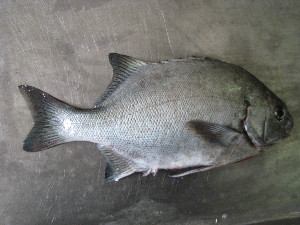
Dichistius is a genus of perciform fishes, the galjoen fishes, native to the Atlantic coast of southern Africa and the Indian Ocean coast of southern Africa. Growing to lengths of 80 cm (31 in) and 35 cm (14 in), both known species are popular commercial and game fishes.

The West African ladyfish is a species of fish in the family Elopidae. It is native to the coastal waters of the eastern Atlantic Ocean, from Senegal to Angola. It is also known as the Guinean ladyfish. Some have been known to grow to 20 lb.
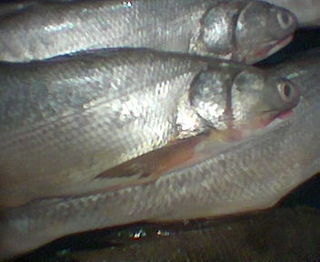
Elops machnata, the tenpounder, is a species of fish in the family Elopidae in the order Elopiformes. This species is found in coastal regions of the Indian Ocean.
Pterothrissus gissu, also known as the Japanese gissu, is a species of fish in the family Albulidae. The Japanese gissu is a rare fish that is distributed in deep water off northwest Pacific Ocean. This fish is known to pass through a leptocephalus larval stage, but only metamorphosed specimens have been available. This species is the only member of its genus.

Albulidae is a family of fish, commonly known as the bonefishes, that are popular as game fish in Florida, select locations in the South Pacific and the Bahamas and elsewhere. The family is small, with 11 species in 3 genera. Presently, the bonefishes are in their own order: Albuliformes. The families Halosauridae and Notacanthidae were previously classified in this order, but are now, according to FishBase, given their own order Notacanthiformes. The largest bonefish caught in the Western Hemisphere is a 16-pound, 3 ounce example caught off Islamorada, Florida, on March 19, 2007.

The Ukrainian brook lamprey is a species of lamprey in the Petromyzontidae family. It is found in brackish and freshwater areas in Austria, Belarus, Bulgaria, the Czech Republic, Georgia, Hungary, Moldova, North Macedonia, Poland, Romania, Russia, Serbia and Montenegro, Slovakia, Turkey, and Ukraine. It invaded the basin of the Volga River in 2001.
Vladykov's lamprey is a species of lamprey in the Petromyzontidae family. It is found in Austria, Germany, The Czech Republic, Bulgaria, Romania, Serbia, and Montenegro.
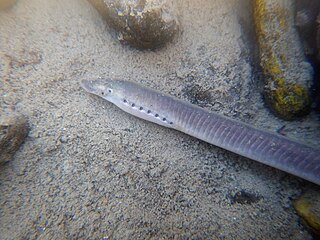
The Lombardy lamprey is a species of lamprey in the Petromyzontidae family. It is found in Croatia, Italy, and Slovenia. Its natural habitats are rivers and freshwater springs. It is threatened by habitat loss.

Lethenteron is a genus of lamprey in the family Petromyzontidae.

The Syr Darya sturgeon is a species of fish in the family Acipenseridae. It is found in Kazakhstan, Tajikistan and Uzbekistan, where it is endemic to the Syr Darya River and, before its drainage, the Aral Sea. Due to the loss of its breeding site and damming projects over the length of the river, it is currently considered Critically Endangered and likely extinct, as no sightings have been reported since 1960. The sturgeon is among the 25 "most wanted lost" species that are the focus of Global Wildlife Conservation's "Search for Lost Species" initiative.
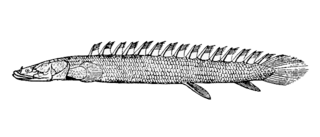
Polypterus bichir, the Nile bichir, is a fish which lives in the Nile and some of its tributaries in Africa. It is a dark grayish color on the top, with a dark vertical marking and bands on the flank. This marking is more prominent on juveniles, and fades as the fish grows.

The Drin brook lamprey is a non-predatory, freshwater resident species of lamprey found in the Drin river system of Albania and Kosovo and the basins of Lakes Ohrid and Shkodra.

Atractosteus is a genus of gars in the family Lepisosteidae, with three species.
Notacanthus is a genus of spiny eels in the family Notacanthidae.
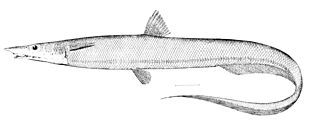
Halosaurus is a genus of fish in the family Halosauridae. This genus currently contains the following recognized species:

Lateolabrax is a genus of commercially important fishes known as the Asian seabasses. It is the only genus in the family Lateolabracidae. This genus is native to the coastal waters of the western Pacific Ocean. This genus has also been included in family Moronidae and may be nested within the Polyprionidae.
Nemoossis belloci, also known as the long-fin bonefish is a species of fish in the family Albulidae endemic to the eastern Atlantic Ocean. This species is the only member of its genus.














